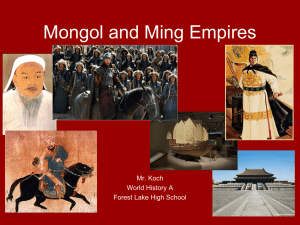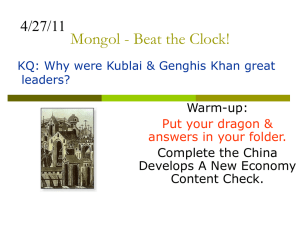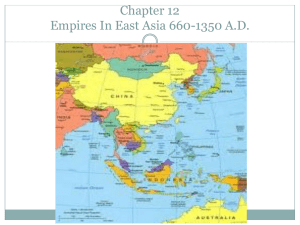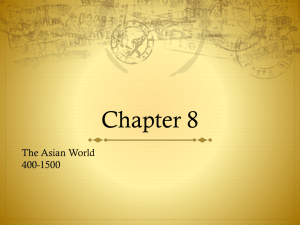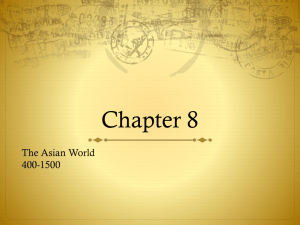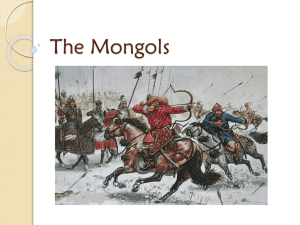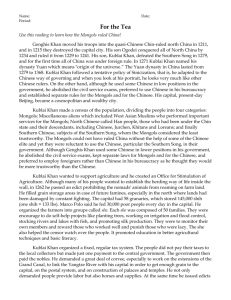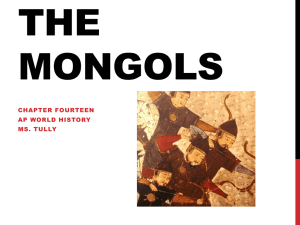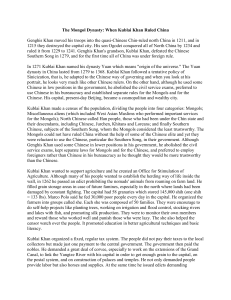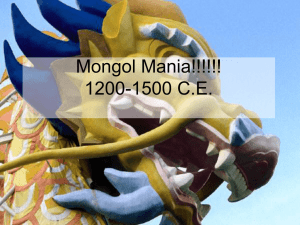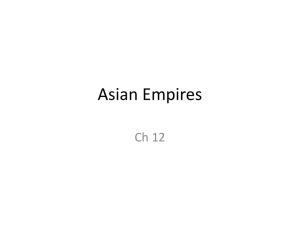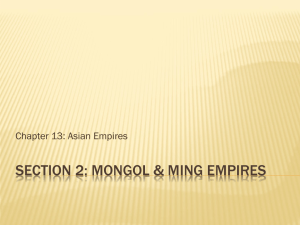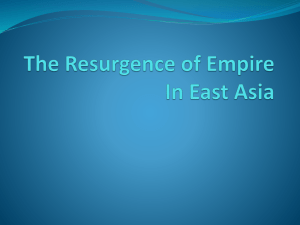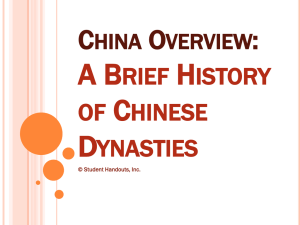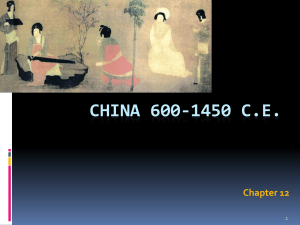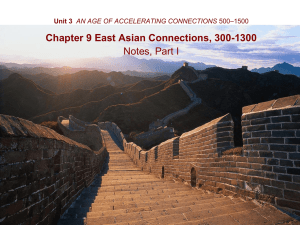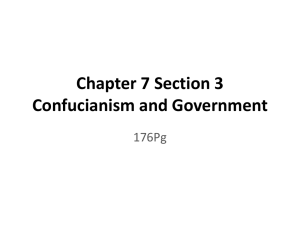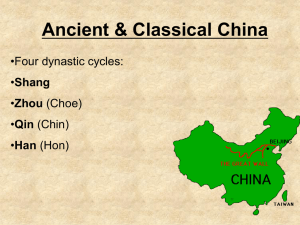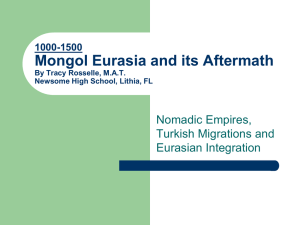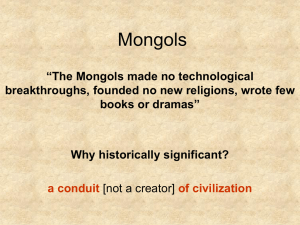TANG DYNASTY - Tarleton State University
advertisement
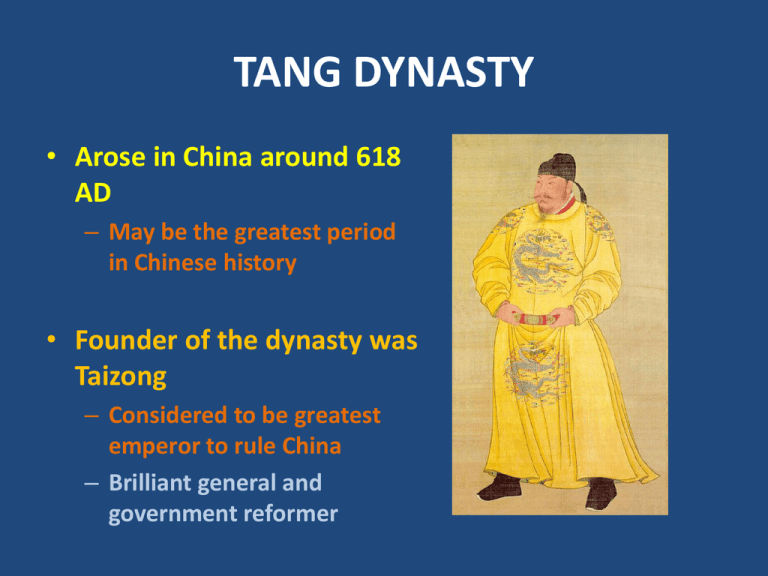
TANG DYNASTY • Arose in China around 618 AD – May be the greatest period in Chinese history • Founder of the dynasty was Taizong – Considered to be greatest emperor to rule China – Brilliant general and government reformer Divided government functions between six ministries: state revenue, public works, defense, justice, personnel, and religious affairs Reorganized local administration Expanded civil service system started by the Hans Founded a university to prepare students for civil service exams Implemented flexible new law code and restructured judicial system to include courts of appeal Expanded Chinese territory by conquering Tibet— thereby opening door for trade with the West Built new capital city at Chang’an and engaged in many public works projects END OF THE TANG DYNASTY • After Taizong’s death in 649, a long line of good emperors extended his work – But after 760, the Tang Dynasty would produce no more great rulers • Chinese power steadily declined as a result • Last Tang ruler and his family were killed during a civil war and Chang’an was burnt to the ground – 907 AD CHANG’AN • Planned city – 30 miles square – Held population of nearly one million people • Another two million lived in suburbs • Largest city in the world • Crowded with markets and temples – But was a government center before all else • Government buildings and emperor’s palace complex occupied several square miles on the northern side of the city TANG BUREAUCRACY • Bureaucracy was huge but performed its job honestly and efficiently • Why? – Board of Censors • Spied on bureaucrats to make sure everyone did their job correctly • Acted as court of appeals for anyone who felt they had not been treated fairly – Educational system • Promotion based exclusively on merit • Weeded out the weak and mediocre • Only the best and brightest made it into the bureaucracy – And only the best and brightest of them were promoted Tang bureaucrat RESPONSIBLITY • Power of government was immense – Every urban neighborhood had its gates locked at midnight • National urban curfew designed to reduce crime – Peasants organized into “collective guarantee groups” • Members had to police themselves and make sure their neighbors behaved themselves – Or else whole group would be punished • Responsibility, not freedom, was keynote of Tang government SONG DYNASTY Song Dynasty founded in 960 by Zhao Kuangyin Would last until 1279 Did not accomplish anything noteworthy in the area of politics and military achievements SONG SCIENTIFIC ACHIEVEMENTS • During Song Dynasty the Chinese invented – The compass • Revolutionized navigation – The printing press • Used block printing • Not movable type – Gunpowder • Used primarily for entertainment purposes – Fireworks • Chinese doctors took the pulse of patients to aid them in their diagnosis and inoculated patients against smallpox ACUPUNCTURE Chinese doctors developed acupuncture It is the practice of inserting needles in precise locations of the body to anesthetize patients for surgery Western doctors are still not sure how it works it might block transmission of pain signals to the brain it might also cause body to manufacture its own anesthesia PROBLEMS • Growing population – Over 100 million under the Songs – Combined with increased taxes resulted in the impoverishment of peasantry • Inflation – Provoked by deficit spending by Songs – Military budget gobbled up 80% of all revenue every year • Forcing government to borrow to pay for other things • Used to support one million man standing army DECLINE IN THE STATUS OF WOMEN I • Growth of concubinage among upper class – When married man’s mistresses live under same roof as his legal wife • And their children have the same rights as his legitimate children DECLINE IN THE STATUS OF WOMEN II • Footbinding – Feet of young girls are tightly wrapped in linen strips • Remained bound in this manner for ten years – Result is the “lily foot” – Men liked this • It showed off the fact that they were so wealthy that their wives did have to work • They also saw the walk produced by this mutilation as sexually exciting • Women were mutilated to satisfy the egos and desires of men GENGHIZ KHAN • Mongols were originally a nomadic tribe of feuding clans from the Gobi Desert – Who united them was Genghiz Khan (“Lord of All Men”) • Born Temujin in 1167 – Son of a minor clan chieftain – Father was murdered and Temujin and a few friends forced into the desert on their own – But they returned after a few years, killed Temujin’s father murderers, and took control of clan MONGOL EMPIRE Genghis Khan then united all the Mongol tribes of the Gobi Desert under his authority He then forged them into a mighty horseback army and used them to create an immense empire that stretched from Chine in the east to Eastern Europe in the west KEY TO GENGHIZ KHAN’S SUCCESS • Mongols believed the key to his success was that he had supernatural powers • More realistically, he had all the qualities common to Mongols and then some extra ones – Tremendous physical strength, endurance, and courage – He was also a natural politician, a military genius, and had a remarkable talent for organization MONGOL ARMY • His army was strange-looking but very powerful – Mongol warriors literally lived backs of their shaggy ponies • Could travel for weeks – Also used version of compound bow • Could kill a man from a distance of ¼ of a mile • Most common tactic was to encircle an enemy – Weaken him with volleys of arrows – Then form into columns and charge GENGHIZ KHAN’S CONQUESTS • First attacked Song China in 1206 – Defeated Song’s million man army and forced them into the south – Did not follow but instead turned west and conquered everything up to and including Persia • Sent raiding parties into Russia and Middle East • But died suddenly in 1227 CREATION OF AN EMPIRE • Mongols returned to Gobi Desert to select new leader – And then continued their conquests: Russia, Middle East, and parts of Eastern Europe (Hungary and Poland) • In 1279, Genghiz Khan’s grandson, Kublai Khan, returned to southern China, finished off the Songs, and took over the rest of the country Kublai Khan Khanate of the Great Khan Khanate of the Golden Horde Chagatai Khanate Ilkhanate Following example of Genghiz Khan, the Mongols divided their empire into four units, called khanates Largest and most important Khanate was the Khanate of the Great Khan, which included the Gobi Desert, China and Korea First of ten rulers was Kublai Khan. Together, they were known as the Yuan Dynasty KUBLAI KHAN’S CHINA Marco Polo • We know quite a bit about the China of Kublai Khan thanks to the journal of Marco Polo – Italian traveler who lived there for 12 years • Mongols kept the Tang administrative system – But suspended the civil service exam system and gave top jobs to Mongols, Persians, and Europeans • Caused extreme resentment among educated Chinese MONGOLS VS CHINESE • Mongol rule was never popular in China and the Mongols were never socially accepted by educated Chinese – Did not wear Chinese clothes – Ate mutton and drank mare’s milk instead of Chinese cuisine – Generally illiterate and put no value on education – Had no last names – Hated to bathe • Mongols simply refused to assimilate into Chinese society END OF THE YUAN DYNASTY Zhu Yuanzhang • Only shrewd leadership and brute force could keep the Mongols in power in China – Never lost the knack for brute force but khans after Kublai Khan were lacking in shrewd leadership – Mongols therefore fought losing battle to stay in power • Also began to increasingly fight among themselves • Finally defeated and expelled by revolt led by Zhu Yuanzhang – Who then founded Ming Dynasty THE END • Same pattern appeared in other khanates as well – Mongols gradually lost control – Started fighting among themselves – Were ultimately defeated and expelled – Returned to the Gobi Desert and their old nomadic lifestyle • Did not leave much of a legacy JAPAN Japan was never a Chinese possession but it did have contacts with the mainland for a long time and it did copy Chinese cultural models until around 900 AD Japanese writing system was based on the Chinese system and the island was governed by a succession of dynasties, just like China AFTER 900 AD • In the capital city of Kyoto, the aristocratic families who lived there and served at the emperor’s court cultivated a delicate and sensitive lifestyle – Emphasized refined poetry, art, and graceful manners BUSHIDO • Out in the countryside, local strongmen (bushi or samurai) developed a more violent lifestyle known as bushido – Since they were warriors, bushido stressed military virtues • Such a courage, pride, and loyalty • And especially stressed honor HONOR • Led hard and simple lives, rejected wealth and comfort, and were prepared for death at any time • Samurai preferred death to any form of dishonor – Preferred execution on the battlefield to the dishonor of living with defeat – Even developed special suicide ritual to cleanse one’s name of dishonor • Called seppuku SHOGUN • Shogun was expected to perfectly embody bushido values • Shoguns were originally military commanders appointed by the emperor from samurai clan leaders – But as the power of the emperor weakened after 1200, shoguns became the real rulers of Japan • Long civil war erupted as various samurai clan leaders struggled to seize and hold this powerful position – 1200-1600 AD TOKUGAWA IEYASU • Powerful samurai clan leader named Tokugawa Ieyasu seized position of shogun in 1603 – Held it for the rest of his life and then passed the position to his son • Founded the Tokugawa Dynasty which controlled the position of shogun from 1603 to 1868 TOKUGAWA JAPAN • Tokugawa shoguns generally provided just and efficient government – But they became increasingly conservative and hostile to outside influences over time • Expelled all foreign merchants and missionaries and cut Japan off from the rest of the world • Distinctive Japanese temperament developed during this period of isolation – Combined artistic sensitivity and ritualized manners of Kyoto aristocracy with bushido sense of honor and duty
